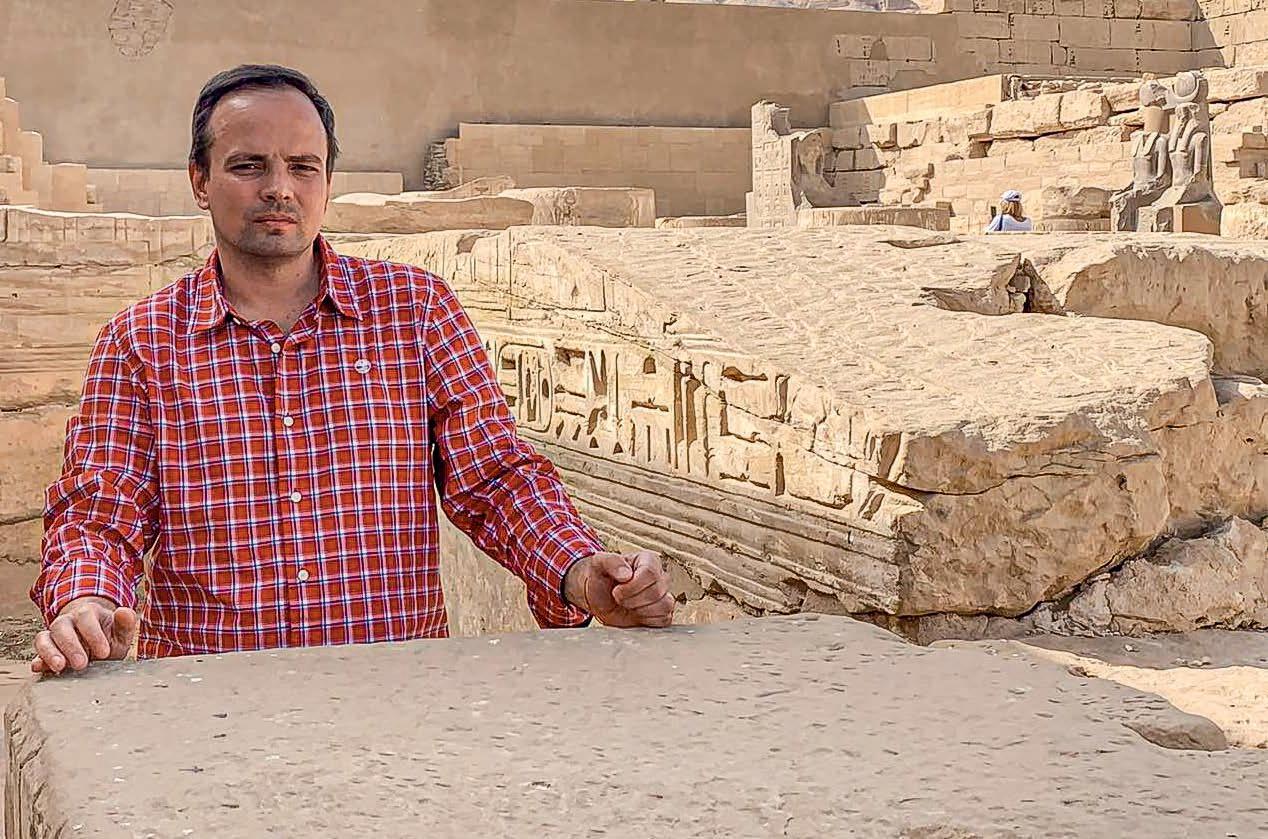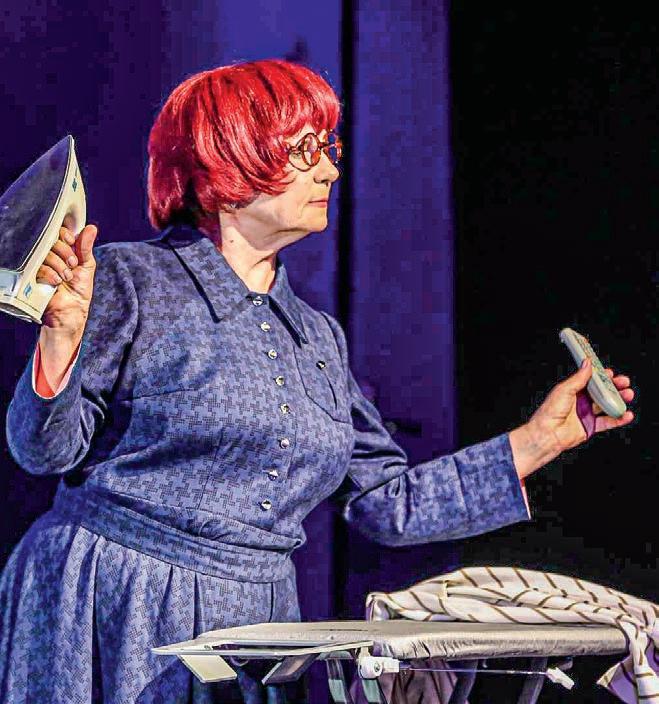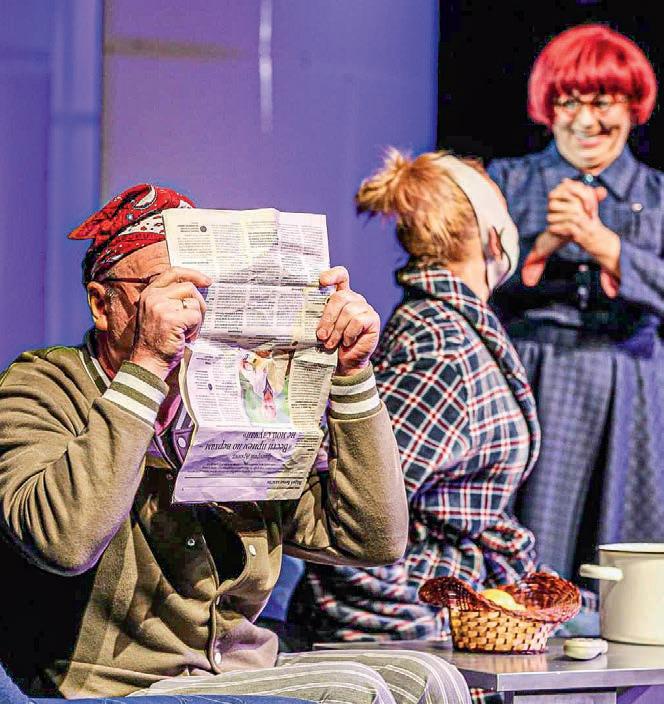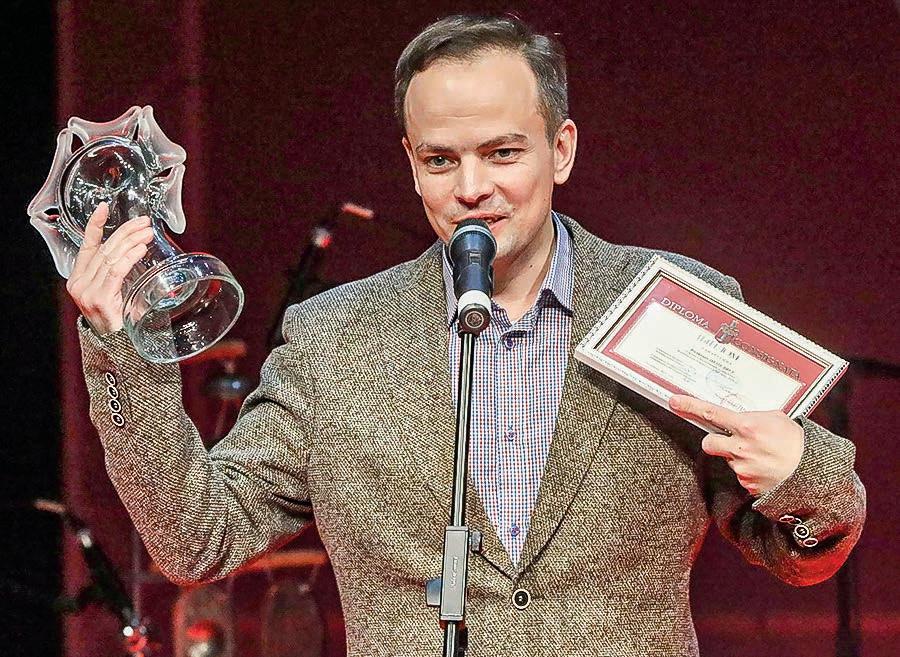
22 minute read
Amazing events are waiting for you
Five reasons to visit ancient Belarusian cities
1. TO FIND A BRIDE IN POLOTSK
Advertisement
The place where it all began. Every schoolchild knows that Polotsk is the cradle of our statehood and culture. Even in the "Tale of Bygone Years" it is said about the Ruriks who reigned on the local throne, were distinguished by their power and love of freedom.
It is interesting that the wives of many ancient Russian princes came from Polotsk. From the infamous Rogneda, who was married to Yaropolk, but by the will of fate became the wife of Vladimir, to Aleksandra Bryachislavna, the beloved wife of Alexander Nevsky. Th ere are still a lot of beauties in Polotsk in our time. It is best to look for them on old Nizhne-Pokrovskaya street, next to which there are the main attractions of the city – St. Sophia Cathedral on the steep bank of the Dvina, the original house where Peter the Great used to stay, the Museum of Local Lore and the Museum of Book Printing. Even if one won't fi nd a bride, amazing cultural discoveries are defi nitely guaranteed!
2. TO GET WISDOM FROM THE TUROV GOSPEL
The tiny town of Turov a thousand years ago was one of the main centers of Christianity in Ancient Russia. Located between Kiev and Polotsk, it occupied an enviable place on the banks of the Pripyat. Not only money flowed in there, but also the brightest minds of their time. Already in the middle of the 12th century, several monasteries and at least 85 churches were founded in the principality. That is why many enlighteners came from Turov, and the Turov Gospel, written in a charter on parchment in chestnut ink, is rightfully considered to be the most ancient Belarusian book.
Prayed-in places today amaze tourists with real miracles. So, in the old part of the city in the last years of the 20th century, stone crosses literally began to grow out of the ground. Another wonder is two twometer crosses, which, as legend has it, sailed up to Turov from Kiev against the current, and are now kept in the Orthodox Church of All Saints.
3. TO RETURN TO THE MEDIEVAL ZASLAVL
Th is place is a gift from Prince Vladimir to his eldest son Izyaslav. Despite a thousandyear history, the name of the city cannot be found in any railway schedule: the station here is called "Belarus". Why? Until 1939, Zaslavl was the first stop for trains going from Europe to the Soviet Union. A kind of gateway to White Ruthenia!
Today the city center is a huge open-air museum. Here one can look at the ancient settlement "Zamechek", hide oneself in "Val" with military fortifications, unravel the secrets of pagan and early Christian mounds and quench one’s thirst with crystal water from ancient springs. For a complete immersion in medieval life, go to the Ethnographic Museum. A mill, a smithy, and authentic huts fully convey the old Belarusian spirit. And children will definitely like the Museum of Mythology and Forest – Domovoy (house sprite), Vodyanoy (water-sprite), Leshy (woodspirit) and Wurdalak (werewolf) always come out to meet young visitors.
4. TO COME ASHORE IN VITEBSK
According to legend, the city painted by Chagall was founded by Princess Olga in the middle of the 10th century. She chose an excellent place, i.e. on the most important trade route "from the Varangians to the Greeks." This predetermined its further destiny. In the 11-12 centuries, the city was subordinated to Polotsk, then Kiev, then Chernigov, then Smolensk princes.
On the Castle Hill there was a detinets (citadel), and at its foot there were settlements of artisans and merchants. Th e only stone building in ancient Vitebsk was the Holy Annunciation Church. Today in the city center one can see only its reconstruction. Nevertheless, the Castle Hill often surprises archaeologists with amazing artifacts. Like, for example, a birch bark letter, dating back to the turn of the 13-14 centuries. Its condition is perfect, and the text is as follows: "From Stepan to Nezhil. If you sold clothes, buy me barley for 6 hryvnia. If you haven't sold anything yet, send me these things back. If you have sold it, be so kind, buy me barley." One can see the medieval message in the regional museum of local lore.
5. TO JOIN WITH PARTISANS IN VOLKOVYSK
According to legend, the inhabitants of this place were real wolfh ounds. Even the ancient Greek historian Herodotus wrote: every inhabitant of the lands between the Dnieper and the Danube turned into a wolf for several days. In the neighboring principalities, they were afraid of evil spirits, which is why they never picked a fi ght with Volkovysk. However, another legend is closer to reality: the local squad could deft ly howl wolf-like during the hunt – this was how they entrapped the beasts.
And the forests here have always been dark and dense, there are many swamps around. It is not surprising that in 1812, when Napoleon was moving to Moscow, the fi rst partisans met him near Volkovysk. Th e dashing hussars, led by Pyotr Bagration, howled like a wolf, and set ambushes in the forest. In short, they did not allow the French to take a breath, day or night.
Today, in the central square of the city, there is a bronze sculpture of the protector beast of Volkovysk.
Sofya Arsenyeva
teSt by nobel,
or to each their oWn
The New Drama Theater in Minsk hosted a number of premieres based on the Nobel Week play by Belarusian journalist Valentin Pepeliaev. We attended one of the premieres.
Iconfess, we were pleasantly surprised, delighted when our colleague invited me to the premiere and said that the play was based on his play. There were many young people in the hall that day. Frankly, we doubted whether they would be interested in the topic outlined in the program. By the way, right in front of the entrance to the hall, to the left of the door, on an electronic board, one could read what "dish" the theater had prepared for us.
Quote: "Nobel Week comedy in an ironic and paradoxical form tells how imperceptibly for ourselves we betray the ideals of our youth and our past dreams. How we find ourselves drawn into the whirlpool of someone else's will and opinions of others, how imperceptibly for ourselves, instead of living natural speech, we suddenly switch to the language of cliches and stereotypes of the mass media and social networks. How imperceptibly, over time, envy of others' success, laziness and idleness grows in us. How impossible sometimes at some point to determine – where we are real, and where are invented?
The collective images of modern intellectuals and "common people", a parody love triangle, elements of absurdity and farce are an occasion to reflect on the opposition of everyday life and feelings, freedom and lack of freedom, on the relationship between the intelligentsia and society, high ideals and indifference. At the same time, one cannot be sure to the end that everything really happens in reality and is not a game of wild fantasy."
So, about the plot. In the provincial town of Drogichin, the action unfolds in the apartment of the Khomutovs. They have been together for many years. And immediately from the initial dialogue of the characters, you can understand: they live side by side out of habit, existing in parallel worlds that intersect only on a purely everyday basis. As such, there is no spiritual closeness between them. Oleg (Sergei Shirochin) is a journalist, works in a local newspaper, as a student he wrote poetry that he is proud of. His wife Ulita (Lyudmila Batalova) is a librarian. The days of their lives are similar to one another. The news breaks into the usual life of the spouses: their classmate Melanya Vamp (Milana Ivanova), with whom our hero Khomutov was in love, receives the Nobel Prize in Literature. Moreover, she comes to Drogichin to not only visit her classmates and share her personal joy, but also to interview the people. Perhaps for their new writing plots. Say, what people live here, what they breathe. In fact, it turns out that the people are petty, lazy, inert and even stupidly fixated on their problems. Melania's desire to urge local residents to live higher, more active, remember the lofty ideals of youth and their dreams sounds like a dissonance: people do not want to change anything in their lives. This is the social mini– slice of the performance. Neighbor Lyusya (Natalya Kapitonova) is obsessed with plastic surgery: I am sure that if she becomes more beautiful, she will
get married. Natella (Oksana Baranok) is convinced that she was abducted by aliens. And Ivan Fidelevech (Igor Nikolaev) is convinced that he is the son of Fidel Castro. Absurd, isn't it?
Sergei Kulikovsky was helped by director Elizaveta Mashkovich, production designer Lydia Malashenko, plastic director Marina Baranova, lighting designer Tatyana Kudinova to work on a satirical comedy, in which the events taking place with the characters are shown in a grotesque form, and they themselves, Sergei Kulikovsky. Video graphics (Sergei Sumin) and, of course, musical numbers can be called a success of the performance. The songs that organically highlight the essence of what is happening sound very beautiful and heartfelt. And the musical composition "Don't Cry" by Tanya Bulanova, where she sings about youth and unfulfilled dreams, does "deliciously" fit into the context of the performance. This is no longer a wave of pamphlet and satire, but a wave of soulfulness that grows from the very depths of the performance.
Reality and fantasy, the truth of life and a little mysticism (one person from Vasily Nitsko's closet is worth something!), The elevation and flat oblivion of the characters, lyrics and silly impulsiveness – all this prompts you to laugh and worry. Restrain involuntary tears and makes you think about yourself, about your life and surroundings.
Nobel Week is a multi– layered performance. It hints: life is so fleeting, and glory is illusory, because, alas, it, like Melania Vamp, our glamorous heroine, did not bring personal happiness and peace. Every "little" person in his place can be happy if he only understands what is the value and mystery of life.
That, we note, it's nice, the young people in the hall watched the performance with bated breath and interest. They reacted adequately to those semantic moments of the production, which, as a rule, you are not interested in at the age of 20– 25. About all this and about such a genre as drama, we talk with Valentin Pepelyaev.
– Valentin, have you written a play about people of pre– retirement age? Why? After all, the public loves the young and the beautiful, the successful and the stylish?
– In a way, for me, this is a story about the generation of my parents. Their youth fell on the Soviet era. Maturity – for the period of the collapse of the USSR. Elegant age – for the time of sovereign Belarus as an independent state. I wondered: in what historical period did they feel most comfortable? What era do they consider themselves to be the product of? In my opinion, they remained Soviet people with their complexes, fears and dreams. They are the notorious "red man", according to Svetlana Aleksievich's formulation, with whom today one can disagree and argue, but whose work, in my opinion, is interesting to study. I would even say – surely.
– And yet about age. Ageism is a widespread phenomenon, unfortunately it is the norm in our life. Society is aging, but the negative attitude towards "old" people among young, beautiful, healthy and successful people still persists in our society. Aren't you afraid in this regard that the play, in which the elderly characters appear, will not interest the directors?




– I would not say that ageism is the main theme of the play and performance. I didn't think about this aspect at all. There are heroines quite 30+ who are obsessed with plastic surgery or believe in the existence of extraterrestrial civilizations. Let it remain on their conscience. It is really more interesting for me to build the composition and the artistic world of a play with older characters – they are more experienced, they have a formed picture of the world, a clear system of views, which can serve as a guarantee of a strong ideological conflict, which is necessary for any play. I think older characters are always interesting to directors. The cult of youth is still for me a synonym for vulgarity, characteristic of mass culture. In addition, in this story, postmodern parallels with "Visit of the Old Lady" Friedrich Dürrenmat's are important for me. It is one of my favorite plays in the world drama, where the main characters are also aged.
– Why did a journalist, one might say an ace in theatrical journalism, a "slave to the lamp," whose column is readily read by colleagues, decide to try his hand at drama? What prompted?
– The feeling of professional slippage, self– repetition, some kind of global internal deadlock. At some point, I realized that I knew what to expect from this or that theater – and this premonition was almost always confirmed. I think the theaters already knew what to expect from the "critic". Our cultural field itself is rather limited. We sometimes talk about the theater in a professional circle more than, in my opinion, it deserves. There are no real breakthroughs and discoveries yet. There is great inertia and pressure from authorities. Apparently, that is why I wanted to take a creative act, which the French writer Michel Houellebecq put into the title of one of his books – "Expanding the space of struggle". I think that people who I annoyed as a journalist and critic, I will continue to annoy as a playwright. For example, an article in the Kultura newspaper, choking in its helpless bile, inspires me with optimism in this regard.
Our insidious age is conducive to fanfare, narcissism and self-promotion. In this fuse of self-promotion, perhaps, you want to seem smarter than you really are. Once, talking with one director about the next premiere, I caught a slight reproach: they say, it's easy to criticize and try to write something for His Majesty Theater yourself, then we'll talk... The director did not pay attention to the argument that critic, journalist and playwright are still different professions. This is how my adventurous idea arose to write a dramatic work based on modern materials. Write, interest others and see the result on the professional stage.
– Why did you choose the New Drama Theater?
– This theater has its origins in the legendary theater studio "Dze– Ya?", which was founded in 1987. It was led by the talented experimenter Nikolai Trukhan. It is excellent theatrical heritage. In its best modern works, the theater demonstrates lightness, a mischievous beginning of the studio and solidity, the precision of high professionalism. He works on Liza Chaikina Street in the Zavodskoy District of Minsk, and an inexperienced viewer often finds himself in the hall. The more interesting it is




performance mosaic
to perform creative tasks. Without dreaming of large national theater venues, where the aspiring author is forced to compete with Chekhov, Shakespeare and Gorky, from the very beginning I set my sights on the talented troupe of the New Drama Theater.
The theater director Vasily Martetsky is open to new proposals, he always hears his team, is ready to take creative risks. The theater's chief director Sergei Kulikovsky has already shown himself to be a great dreamer with a taste for beautiful gestures and healthy innovation. (The fact that innovation is sometimes unhealthy, alas, cannot be argued). Together, Martetsky and Kulikovsky create a strong professional tandem capable of realizing a variety of tasks.
– Are you, a quiet young man, really so interested in the problems that are solved in the play?
– Would I have written it then? They really are. I worked on the play for two years, and if the topic did not excite, the venture could be abandoned halfway. Relations between the intelligentsia and society, the "common people", conventional intellectuals and hard workers, the capital and the province seems to me today to be a key problem for the Belarusian sociopolitical context. I see a split, a reluctance to hear opponents, an increase in hostility. The culture of public discussion is monstrously lame. Instead of argumentation, rudeness, insults are used... To me, a person who was formed in the situation and a vivid public dialogue of the 90s, listened to Sakharov's speeches, Likhachev, who did not miss a single episode of the program "Vzglyad", who has Ural roots on his father, dating back to Viktor Pepeliaev, who was shot together with Kolchak, it is sad to watch this degradation. A new digital or technological dictation has brought us nothing but problems. There are more gadgets, freedom of expression has become an end in itself, and new meanings are not being formulated. People are pouring from empty to empty, trying to suck each other in what is called last year's snow. We walk in a circle of ideas about life and social world order imposed on us. Stereotypes prevail. However, in order to avoid moralizing and boredom, I added a playful carnival beginning to these thoughts, recalling Bakhtin's formulation "carnivalization of culture" (Mikhail Mikhailovich Bakhtin is a Russian philosopher, culturologist, literary critic, theorist of European culture and art – ed.). By and large, Nobel Week is a modern theater of masks, a comedy del arte, but with recognizable archetypes of modern pop culture, oral folk art and anecdotes: "simpleton husband", "unloved wife", "friend is a lover", "neighbor philosopher ", "a broken divorcee", etc.
– In one of your interviews you said: "The theater should interact directly with real life." How do you think this is so?
– Writer and playwright Yuri Polyakov in an interview with me called drama "direct heart massage." It takes years for a novel to come out to the reader and be read. A playwright can turn to real life, to real problems and talk about them from the stage, bypassing such a long period of time. This does not mean that you need to follow the principle in the morning – in the newspaper, in the evening – in the verse", but not to react to painful points of time, to the problems of your country and challenges of the time, no matter how pathetic it sounds, the thinking author cannot. Theater for me is still a pulpit, a temple, and a public tribune. When a possible and quite acceptable for me publicistic beginning in the text is combined with high theatrical poetry for me this is a high class. I do not like indirection in art, dry speculative constructions without vivid characters and situations, as well as stupid entertainment, as well as the crap of the "new drama" that has become a commonplace.
– What, in your opinion, is the role of the playwright in the theater of the future?
– In Western theaters, in particular in German, there is such a position as "full- time playwright" – the author works at the theater and writes plays, based on the capabilities of the corpse and those topics that concern the director. It seems to me that we will come to this too. A playwright should not write without publication. He should not knock the thresholds of theaters for years. The play must be played on stage, only then it becomes a complete artistic statement. Therefore, I see the playwright at the center of the theatrical process as a key figure and structuring chaos.
– Did Sergey Kulikovsky understand you correctly?
– When I asked the director Kulikovsky, known for his sharp reading of modern and classical plays, what seemed to him the main thing in this story, he replied: "For me, by and large, this is a story about love and death at an acute social cut. In several other characters, I saw in the monologues the real pain that breaks through there. We do not

actors milana ivanova and Sergei Shirochin in the roles of melanya and oleg khomutov
hang labels, we do not take sides... There is and do it! Little money – work harder and the two main characters of the play, is so a reason for any assessments and reflections. better. My husband is not happy, go away! brilliantly good and young... She reads the Many of the questions the heroes are asking If you don't like your job, change it... Don't thought of youth and beauty of the soul. It today sound very relevant. I like his answer. look for someone to blame, don't envy your seems to me that this is a successful find of I think everyone will find their own answer neighbor... the director. After all, as you said, Melania for themselves." What did you find? These are the thoughts that prompted me is in the play, the heroine is also of age... – I left the hall in high spirits, to play based on your play. What do you say? – Yes, I agree that Melania's youth is delighted: the debut of my colleague working on the idea of the play. A as a playwright took place. Therefore, hner series of secondary characters was S Valentin, I sincerely congratulate you. Thanks to the performance, I alexei ku conceived as a gallery of frankly farcical images that have one explicit became even more convinced that I am and exaggerated "quirk" in the personally happy with my life. After psyche. They seemed to have left the all, this is the result of my capabilities TV screen... Someone is obsessed and aspirations, ambitions, finally. I with plastic surgery, someone like that I am not skeptical about what believes that he is the illegitimate son I have, I do not envy people who are of Fidel Castro, someone is sure that higher on the social ladder. However, he came into contact with aliens... above and below is just an accepted Probably, this is dictated by some condition in society. Even then for those internal problems. For example, the who attach too much attention to this Valentin pepelyaev, laureate of the national competition actor Igor Nikolaev in the role of standing. For me, it is more important "golden letter 2020" in the nomination "best cultural Ivan Fidelevich managed to embody how professional and human a materials", during the presentation of a special prize of the a whole social phenomenon of person is in his position, whether he is national theater award – honorary diploma of the provincial "couch critics" who boldly developing. I confess, it was pleasant to belarusian theater workers' union and the belarusian union talk about the fate of the world with note about myself: I am satisfied with of literature and art critics for bright and talented a glass in hand. The actor sniped the results of my work, in which I try to reportings in 2016-2018”. into this comic and bitter character. be in motion. I like that the Belarusian Neither add nor subtract. Union of Journalists, together with my – I am, of course, pleased to hear – But, you must agree: all these husband Ivan Zhdanovich, marked me with that the play has evoked such personal "quirks", deviations are just born from a joint "golden pen" in 2015. I also like that associations... dissatisfaction with oneself, from internal
we walked 2810 km along the State Border – It may seem strange to you, Valentin, problems. And your "black" man from of Belarus in 1996. Nobody in the world has but in the dialogue of the main character the closet is such a cool reminder of how walked around their country before us! Only with Melania performed by Sergei something petty, flattering, nasty, slippery now, years later, am I starting to be proud Shirochin, I saw the hero's breakthrough inside us, something that is not God's, that we did it! I appreciate my profession, into the realization that his modest pushes us to unseemly acts, to justify my modest life, which does not prevent me provincial realities of life and profession ourselves, loved ones... Brilliant work from doing what I love – writing. All this is are quite acceptable for life. Oleg is far of the actor Vasily Nitsko, whose hero the result of my choice. Why should I be sad from being a trivial type who just fulfills skillfully mirrors our insides. And what about the fact that, say, I don't write poetry, his task in the service. So far, in my kind of plastic!
or I don't sing on the stage of the Bolshoi opinion, he simply cannot accept what he – His hero is even compared to a Theater, or I just can't finish my unfinished is. After all, a talented person! The actor is demon. I repeat, everyone will find their novel... Therefore, the feeling of the joy of wonderful in dialogue with Melania, the own in the performance of the New life as the basis of being in me is born every childishness of the soul of his character, Drama Theater. Maybe their own demons. time I open my eyes to meet a new day. But when he talked about poetry. And at that Of course, if our play hooks a person's you have to interact with people who are moment he did not look like a tired old soul. But even if someone comes to the not satisfied with their life. These are those man. Yes, his own components mutate theater with a bad mood, the play will for whom movement, self-development is about the correctness of his life, and wife entertain a little, distract from personal an empty phrase, or mind games. I just Ulita by Lyudmila Batalova, convincing problems, this is also not bad. As they say, want to tell her, or him: if dissatisfaction her husband, they say, everything is fine to each his own.
with yourself, with your wife or husband, with them, close to accepting life as it is.
with a modest position has arisen in you, And then the "explosive" Melania... By the Interviewed by Valentina and Ivan Zhdanovich move more actively through life. Take it way, it is clear why she, the same age as Photo credit: minsknews.by, sb.by






